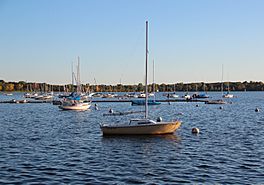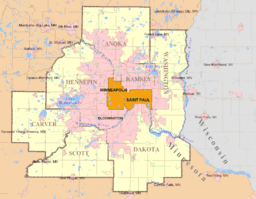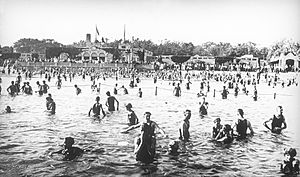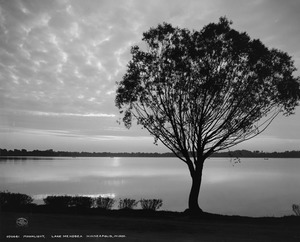Bde Maka Ska facts for kids
Quick facts for kids Bde Maka Ska |
|
|---|---|
| Lake Calhoun | |

Boats on the lake in 2017
|
|
| Location | Minneapolis, Minnesota |
| Coordinates | 44°56′30″N 93°18′45″W / 44.94167°N 93.31250°W |
| Native name | Bdé Makhá Ská (Dakota) |
| Basin countries | United States |
| Surface area | 401 acres (1.62 km2) |
| Average depth | 82 ft (25 m) |
| Max. depth | 87 ft (27 m) |
| Water volume | 0.0405 cubic kilometres (0.0097 cu mi) |
Bde Maka Ska ( previously known as Lake Calhoun) is the largest lake in Minneapolis, Minnesota, United States, and part of the city's Chain of Lakes. Surrounded by city park land and circled by bike and walking trails, it is popular for many outdoor activities. The lake has an area of 401 acres (1.62 km2) and a maximum depth of 87 feet (27 m).
Lake and surrounding area
The lake is part of the Grand Rounds National Scenic Byway, connecting with Lake of the Isles on the northeast, Cedar Lake and Brownie Lake on the northwest, and Lake Harriet on the south. The Minneapolis Park and Recreation Board trail system has a 3.4-mile (5.5 km) trail around the lake for bicyclists and skaters and a 3.2-mile (5.1 km) trail around it for pedestrians. Both of these trails connect to the larger trail system via connections to Lake of the Isles and Lake Harriet. In addition, the Midtown Greenway Trail is located just north of the lake and Lake Street. The lake itself is popular for canoeing, kayaking, and windsurfing, and it has three swimming beaches.
The three beaches are North Beach on the north side of the lake, 32nd Beach on the east, and Thomas Beach on the south. There is Bde Maka Ska Park and surrounding park land offers parking, picnicking, volleyball, and athletic fields. It is also home of sailing, hosting the Calhoun Yacht Club, the Minneapolis Sailing Center, as well as local high school teams and the University of St. Thomas Sailing Team.
From 1829-1839, it was the site of the Bdewákhathuŋwaŋ Dakota agricultural village known as Ḣeyate Otuŋwe. A plaque on the east side of the lake commemorates the mission station built by Samuel and Gideon Pond where they created the first alphabet for the Dakota language at Cloudman's Village. In 2019, the Bde Maka Ska Public Art Project was completed on the village site. On the west side is The Bakken, an old mansion with medicinal gardens and a library and museum devoted to medical electricity and the history of electromagnetism. The Como-Harriet Streetcar Line operates between the lake and Lake Harriet.
Naming
Historic names
The Dakota originally called the lake Mde Maka Ska (standardized Lakota/Dakota spelling Bdé Makhá Ská; English approximation: Be-DAY Mah-KAH-Ska) meaning Lake White Earth, or Lake White Bank, a name that probably was given by the Ioway who inhabited the area until the 16th century. Another Dakota name for the lake may have been Mde Med'oza, which was the name initially adopted by settlers, either as Lake Medoza or in translation as Loon Lake. The Dakota also described it as Heyate Mde, meaning the set back lake.
Calhoun naming
The United States Secretary of War, John C. Calhoun, sent the Army to survey the area that would surround Fort Snelling in 1817. Calhoun had also authorized the construction of Fort Snelling, one of the earliest American settlements in the state. The surveyors named the water body "Lake Calhoun" in his honor, and the Fort Snelling Military Reservation survey map of Lt. James L. Thompson in 1839 shows that name for the lake.
In 2017, the Minneapolis Park Board voted unanimously to recommend changing the lake's name back to Bde Maka Ska and the Hennepin County commissioners agreed. In January 2018, the Minnesota Department of Natural Resources (DNR) made Bde Maka Ska the official name in Minnesota. To change it at the federal level, the state submitted materials to the U.S. Board on Geographic Names, which approved the change in June 2018. Park signs around the lake use only the name Bde Maka Ska.
Wildlife
The lake contains black crappie, bluegill, bowfin, common carp, hybrid sunfish, largemouth bass, northern pike, pumpkinseed, tiger muskellunge, walleye, white sucker, and yellow perch. Some fish consumption guideline restrictions have been placed on the lake's bluegill, crappie, largemouth bass, northern pike, walleye, and white sucker due to mercury and perfluorooctanesulfonic acid contamination.
In 1991, the then-Minnesota state record tiger muskellunge at 33 pounds 8 ounces (15.2 kg) was caught in the lake. The Minneapolis Park and Recreation website lists the lake as one of the best in the city for ice fishing walleye, northern pike, and crappies.
Zebra mussels, an aquatic invasive species, were found in the lake in 2018.
See also
 In Spanish: Lago Calhoun para niños
In Spanish: Lago Calhoun para niños








